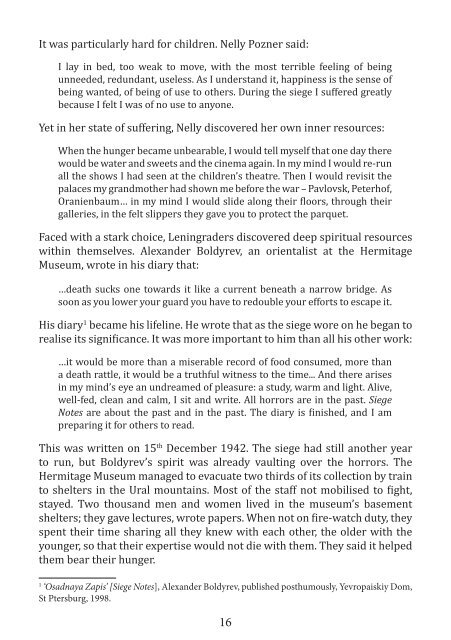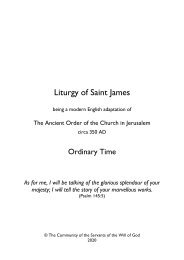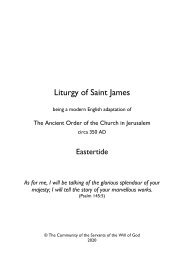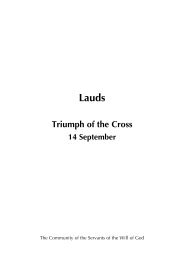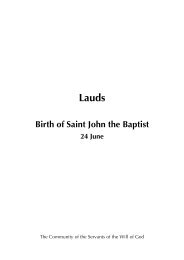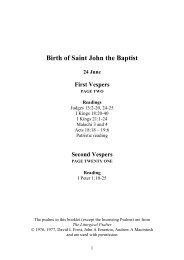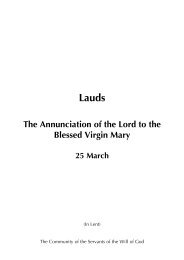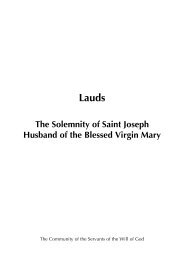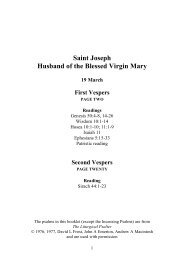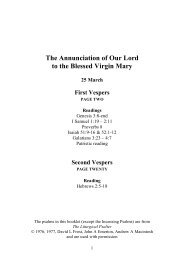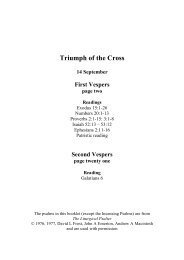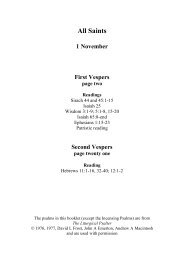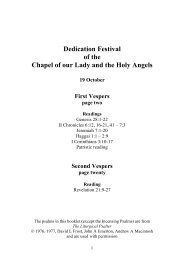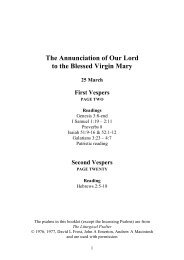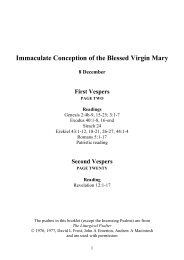Peace in the Face of War
Create successful ePaper yourself
Turn your PDF publications into a flip-book with our unique Google optimized e-Paper software.
It was particularly hard for children. Nelly Pozner said:<br />
I lay <strong>in</strong> bed, too weak to move, with <strong>the</strong> most terrible feel<strong>in</strong>g <strong>of</strong> be<strong>in</strong>g<br />
unneeded, redundant, useless. As I understand it, happ<strong>in</strong>ess is <strong>the</strong> sense <strong>of</strong><br />
be<strong>in</strong>g wanted, <strong>of</strong> be<strong>in</strong>g <strong>of</strong> use to o<strong>the</strong>rs. Dur<strong>in</strong>g <strong>the</strong> siege I suffered greatly<br />
because I felt I was <strong>of</strong> no use to anyone.<br />
Yet <strong>in</strong> her state <strong>of</strong> suffer<strong>in</strong>g, Nelly discovered her own <strong>in</strong>ner resources:<br />
When <strong>the</strong> hunger became unbearable, I would tell myself that one day <strong>the</strong>re<br />
would be water and sweets and <strong>the</strong> c<strong>in</strong>ema aga<strong>in</strong>. In my m<strong>in</strong>d I would re-run<br />
all <strong>the</strong> shows I had seen at <strong>the</strong> children’s <strong>the</strong>atre. Then I would revisit <strong>the</strong><br />
palaces my grandmo<strong>the</strong>r had shown me before <strong>the</strong> war – Pavlovsk, Peterh<strong>of</strong>,<br />
Oranienbaum… <strong>in</strong> my m<strong>in</strong>d I would slide along <strong>the</strong>ir floors, through <strong>the</strong>ir<br />
galleries, <strong>in</strong> <strong>the</strong> felt slippers <strong>the</strong>y gave you to protect <strong>the</strong> parquet.<br />
<strong>Face</strong>d with a stark choice, Len<strong>in</strong>graders discovered deep spiritual resources<br />
with<strong>in</strong> <strong>the</strong>mselves. Alexander Boldyrev, an orientalist at <strong>the</strong> Hermitage<br />
Museum, wrote <strong>in</strong> his diary that:<br />
…death sucks one towards it like a current beneath a narrow bridge. As<br />
soon as you lower your guard you have to redouble your efforts to escape it.<br />
His diary 1 became his lifel<strong>in</strong>e. He wrote that as <strong>the</strong> siege wore on he began to<br />
realise its significance. It was more important to him than all his o<strong>the</strong>r work:<br />
…it would be more than a miserable record <strong>of</strong> food consumed, more than<br />
a death rattle, it would be a truthful witness to <strong>the</strong> time... And <strong>the</strong>re arises<br />
<strong>in</strong> my m<strong>in</strong>d’s eye an undreamed <strong>of</strong> pleasure: a study, warm and light. Alive,<br />
well-fed, clean and calm, I sit and write. All horrors are <strong>in</strong> <strong>the</strong> past. Siege<br />
Notes are about <strong>the</strong> past and <strong>in</strong> <strong>the</strong> past. The diary is f<strong>in</strong>ished, and I am<br />
prepar<strong>in</strong>g it for o<strong>the</strong>rs to read.<br />
This was written on 15 th December 1942. The siege had still ano<strong>the</strong>r year<br />
to run, but Boldyrev’s spirit was already vault<strong>in</strong>g over <strong>the</strong> horrors. The<br />
Hermitage Museum managed to evacuate two thirds <strong>of</strong> its collection by tra<strong>in</strong><br />
to shelters <strong>in</strong> <strong>the</strong> Ural mounta<strong>in</strong>s. Most <strong>of</strong> <strong>the</strong> staff not mobilised to fight,<br />
stayed. Two thousand men and women lived <strong>in</strong> <strong>the</strong> museum’s basement<br />
shelters; <strong>the</strong>y gave lectures, wrote papers. When not on fire-watch duty, <strong>the</strong>y<br />
spent <strong>the</strong>ir time shar<strong>in</strong>g all <strong>the</strong>y knew with each o<strong>the</strong>r, <strong>the</strong> older with <strong>the</strong><br />
younger, so that <strong>the</strong>ir expertise would not die with <strong>the</strong>m. They said it helped<br />
<strong>the</strong>m bear <strong>the</strong>ir hunger.<br />
1<br />
‘Osadnaya Zapis’ [Siege Notes], Alexander Boldyrev, published posthumously, Yevropaiskiy Dom,<br />
St Ptersburg, 1998.<br />
16


